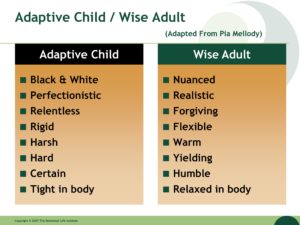The Five Losing and Winning Strategies are extracted from Terry Real‘s book “The New Rules of Marriage“.
When you’re talking to your partner and your emotions start to escalate, one of the most important questions to ask yourself is “Which part of me is talking?” Is it the mature, present-based, functional adult part (associated with thinking & planning) which wants a solution? Or is the immature, reactive child part (associated with the emotional brain)? If it’s the second part, we want be proven right, control our partner, vent frustration or anger, or lead with contempt and self-righteousness? These are the losing strategies of our “first consciousness”.
The kindest and most respectful thing you can do for yourself and your partner is to learn to recognize when you’re in a reactive (immature child) state of mind and Stop, Breathe, Think & Choose. This is called practicing Relational Mindfulness. This daily practice builds “second consciousness”, a consciously learnt adult response to dealing with relationships. It is practicing relational mindfulness.
Practicing Relational Mindfulness means you stop and think. Before you say or do anything, ask yourself “Am I remembering that I love this person? Is the reason I’m speaking to make things better?” or “How will this affect my partner?” This is how you can access the five winning strategies in a state of relational mindfulness.
The Five Losing Strategies
1. Needing to be Right
- Finding out whose view is more “valid” or accurate”.
- Leads to endless objectivity battles.
- Fuels the psychological violence of self-righteous indignation.
2. Controlling Your Partner
- Can be direct or indirect (manipulation).
- Short of outright coercion, control is an illusion.
- People don’t like being controlled. Payback is inevitable.
3. Unbridled Self-expression
- “I have the right and the need to share my feelings with you ‘spontaneously.'”
- The idea that all sharing is authentic and will increase closeness.
- Rarely engenders generosity in others.
4. Retaliation
- Perverse justice: “Offending from the victim position.”
- Perverse communication: Trying to “make you feel what I feel.”
- Can be explicit or covert (passive aggressive).
5. Withdrawal
- Differs from responsible distancing taking.
- Stems from either resignation or retaliation.
- Often masquerades as mature acceptance.
The Five Winning Strategies
1. Shifting from Complaint to Request
- Move from a negative/past to a positive/future focus. Don’t criticize-ask!
- Make your requests specific, behavioral, and reasonable.
2. Speaking Out with Love and Savvy
- Contract with your partner to engage in the repair process.
- Remember Love.
- Use the four steps of the feedback wheel:
- What I saw or heard
- What I made up about it
- How I feel about it
- What I’d like
- Let go of outcome.
3. Responding with Generosity
- Listen to understand.
- Acknowledge whatever you can.
- Give whatever you can.
4. Empowering Each Other
- Acknowledge the gifts the responder has offered.
- Ask what you might do to help the responder deliver.
- Acknowledge whatever you can and give whatever you can.
5. Cherishing
- Remember abundance.
- Giver you partner specific positive feedback.
- Nourish yourself and your relationship with time and energy.
- Practice smart generosity.
- Inhabit your talents and gifts without owning or disowning them.
- Give back to the world.

